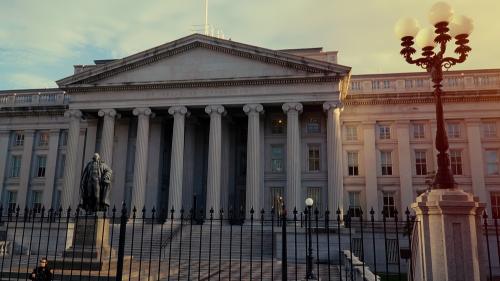The U.S. confronts not one but two economic challenges: its worst recession since the Depression and a growing imbalance between federal spending and revenues that makes its underlying fiscal policy unsustainable.
To get the economy going, the Obama administration and Congress have committed trillions of dollars to bailouts of the financial and automobile industries and to a stimulus package of tax cuts and government spending. These measures, on top of our current economic weakness and the imbalance between spending and revenues, have left us with a projected federal budget deficit of $1.7 trillion in 2009, or 12% of U.S. gross domestic product, a deficit share we have not even approached since World War II.
Most economists accept the need to put aside concerns about fiscal balance as we address the recession. But soon enough we will face pressure to shift our focus from the short-term economic problem to our longer-term fiscal problem. And, unfortunately, poor policy choices in the past combined with the enormity of the recession make the second problem worse and reduce the time we will have to deal with it.
The nature of our short-term problem is evident to all of us, as workers anxious about the future of our jobs, as homeowners worrying about the declining values of our houses, and as Californians wondering whether our state government can still function. The longer-term problem, though, is less apparent to most of us, and its more subtle nature has, until now, left our political leaders with little incentive to act.
There are two parts to the problem. First, over the next decade or so, even once we recover from the recession, federal revenues will fall far short of federal spending. Under the policies laid out in the Obama administration’s recent budget, for example, the annual deficit will be 5.5% of GDP by 2019, an exceptionally high share in normal times. In the meantime, the national debt will accumulate so rapidly that it will stand at 82% of GDP, its highest mark since 1948, when we were paying off our war debts.
And we will be looking ahead to even larger deficits and faster debt accumulation. That’s because of the second element of the problem, the rapid growth of our “big three” entitlement programs: Social Security, Medicare and Medicaid. Due to an aging population and ever-increasing medical costs, these programs are growing much faster than the tax revenues we have to pay for them.
These realities aren’t news, although the Bush administration’s policies of massive tax cuts and increased spending on all fronts made these underlying problems substantially worse. Recent developments, however, have made ignoring the situation much harder.
The deficits projected over the next 10 years will accelerate our arrival at a debt-to-GDP ratio that for most countries would signal impending fiscal collapse. Indeed, Britain, with a debt-to-GDP ratio not appreciably worse than ours, was just warned by Standard & Poor’s that its creditworthiness might be downgraded. The United States has traditionally enjoyed a favored status in this regard, as the supplier of the dollar, the world’s reserve currency, and as a perceived haven in times of financial stress. But for how long?
In March, Chinese Prime Minister Wen Jiabao publicly questioned the safety of U.S. Treasury debt. Over the winter, prices in credit-default swap markets implied a significant probability of default on U.S. debt in the next five years.
Default on national debt is what happens in failed states and banana republics; such a possibility for the U.S. would have been unthinkable in the past.
All of this will finally force difficult choices on policymakers. Healthcare reform, for example, is crucial if we’re to fix entitlement programs. But it alone won’t be enough. Spending will have to drop, and taxes will have to rise. And the choices could get harder still. If the economy recovers very slowly, those decisions will need to be faced in the context of a weaker economic situation with demands for further fiscal stimulus.
In the immediate future, policymakers will face a delicate balancing act between encouraging economic recovery and establishing fiscal sustainability. Short-term stimulus can boost an otherwise weak economy, so withdrawing stimulative policies and imposing fiscal discipline too soon could slow the recovery. But delaying fiscal discipline too long could be equally destructive. Success will take new ideas, some luck and uncharacteristic honesty and resoluteness — from our leaders in Washington and from the rest of us.
Read their full paper An Update on the Economic and Fiscal Crisis: 2009 and Beyond »
The Brookings Institution is committed to quality, independence, and impact.
We are supported by a diverse array of funders. In line with our values and policies, each Brookings publication represents the sole views of its author(s).



Commentary
Op-edHere Comes the Next Fiscal Crisis
July 8, 2009